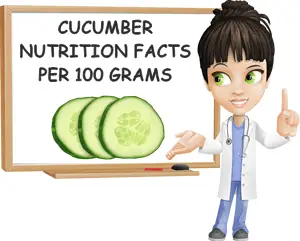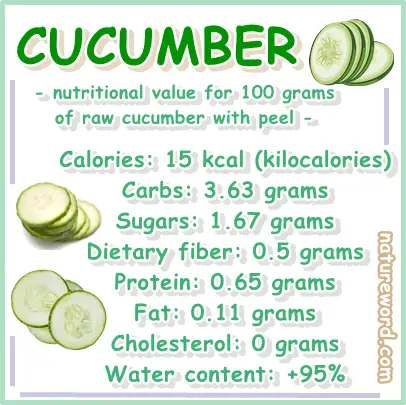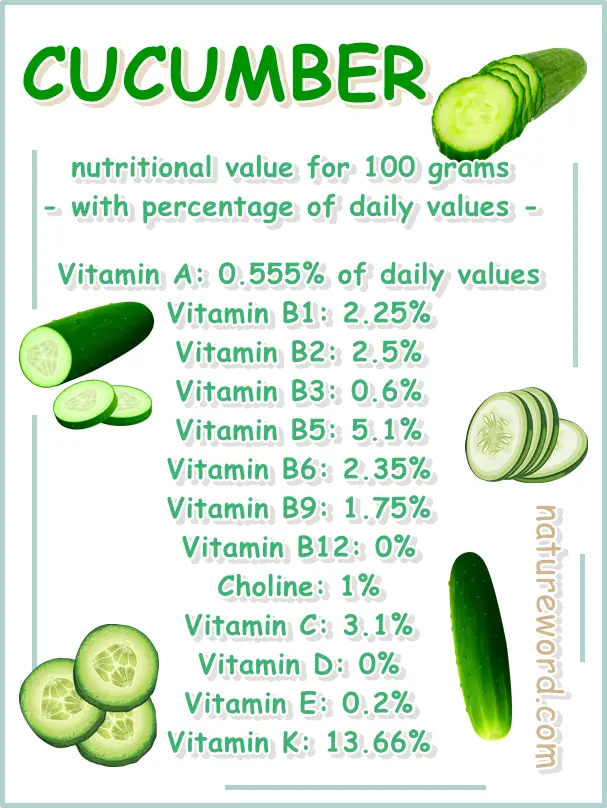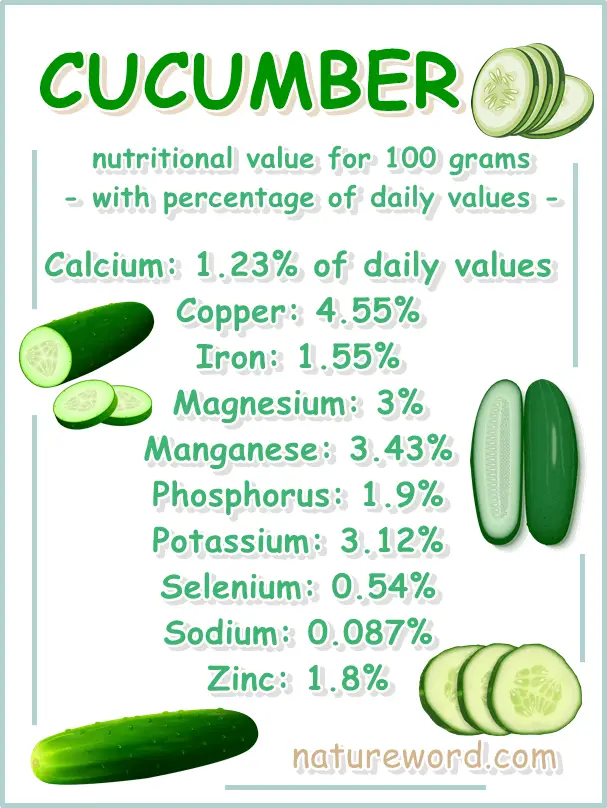Most of the foods we eat on a regular, if not daily basis are not actually packed with nutrition despite hearing and reading they are absolutely everywhere. And while it’s good to include nutritionally dense foods in your diet, foods that are not high in nutrition are also healthy and just as good for you, but in other ways. The same is true for cucumbers whose nutrition is poor by all standards, yet they bring important benefits for health to the table.
What is the nutritional value of cucumbers?
By all standards, the nutritional value of cucumbers is poor. To be more exact, a portion of 100 grams of raw cucumber with peel, which is a standard serving size, provides less than 5% of daily values for most essential micronutrients.
The only real notable nutritional facts of cucumbers are their vitamin K content which is a little over 10% of daily values for 100 grams and water content which is at over 95%.

What is the nutritional value of food about?
When tackling the notion of the nutritional value of a food, up to 27 essential micronutrients are considered: vitamin A, whether preformed vitamin A in the form of retinol or provitamin A in the form of carotenoid antioxidants with vitamin A activity, vitamins B1, B2, B3, B5, B6, B9 and B12, biotin, choline, fat-soluble vitamins A, D, E and K, and dietary minerals calcium, chromium, copper, iodine, iron, magnesium, manganese, molybdenum, phosphorus, potassium, selenium, sodium and zinc.
Additionally, 7 more essential macronutrients are considered: energetic value measured in calories or kilocalories (kcal), water content, fat and protein content, and carbohydrate content split in total carbs, sugar and dietary fiber content. Animal foods also include values for cholesterol which is absent in plant foods.
The nutrition of most foods covers all the range of macronutrients, despite some being very poorly represented, and most micronutrients. Up next we’ll be seeing how many essential vitamins, dietary minerals and macronutrients are in 100 grams of cucumber, and how much of the daily nutritional requirements for the average adult the nutrition of 100 grams of cucumber covers.

Cucumber nutrition facts per 100 grams
Nutrition data for 100 grams of raw cucumber, with peel, all commercial varieties considered:
- Energetic value: 15 kcal (kilocalories, calories)
- Carbohydrates content: 3.63 grams
- Sugar content: 1.67 grams
- Fiber content: 0.5 grams
- Protein content: 0.65 grams
- Fat content: 0.11 grams
- Cholesterol content: mg (milligrams)
- Water content: 95.2 grams
Vitamins in 100 grams of raw cucumber with peel:
- Vitamin A: 5 mcg (micrograms) from provitamin A pigmented antioxidants
- Vitamin B1: 0.027 mg (milligrams)
- Vitamin B2: 0.033 mg
- Vitamin B3: 0.098 mg
- Vitamin B5: 0.259 mg
- Vitamin B6: 0.04 mg
- Vitamin B9: 7 mcg
- Vitamin B12: 0 mcg
- Choline: 6 mg
- Vitamin C: 2.8 mg
- Vitamin D: 0 mcg
- Vitamin E: 0.03 mg
- Vitamin K: 16.4 mcg
Minerals in 100 grams of raw cucumber with peel:
- Calcium: 16 mg
- Chromium: data not available
- Copper: 0.041 mg or 41 mcg
- Iodine: data not available
- Iron: 0.28 mg
- Magnesium: 13 mg
- Manganese: 0.079 mg
- Molybdenum: data not available
- Phosphorus: 24 mg
- Potassium: 147 mg
- Selenium: 0.3 mcg (micrograms)
- Sodium: 2 mg
- Zinc: 0.2 mg
Nutrition data from USDA.gov.

Cucumber daily nutritional values (in 100 grams)
Daily values of macronutrients (fat, protein, carbs, cholesterol) for 100 grams of raw cucumber with peel, all commercial varieties considered:
- Calories: 0.75% of total daily calories for the average adult on a 2000 kcal diet
- Carbs: 1.3% of daily carbohydrate values for the average adult
- Protein: 1.3% of daily protein values
- Fat: 0.14% of daily fat values
- Cholesterol: 0% of daily cholesterol values
- Sugar: While cucumber has trace amounts of actual sugar, it doesn’t have any added sugars and that means it does not count towards daily added sugar values.
Daily values of essential vitamins for 100 grams of raw cucumber with peel:
- Vitamin A: 0.555% of daily values
- Vitamin B1: 2.25% of daily values
- Vitamin B2: 2.5% of daily values
- Vitamin B3: 0.6% of daily values
- Vitamin B5: 5.1% of daily values
- Vitamin B6: 2.35% of daily values
- Vitamin B9: 1.75% of daily values
- Vitamin B12: 0% of daily values
- Choline: 1% of daily values
- Vitamin C: 3.1% of daily values
- Vitamin D: 0% of daily values
- Vitamin E: 0.2% of daily values
- Vitamin K: 13.66% of daily values

Daily values of essential minerals for 100 grams of raw cucumber with peel:
- Calcium: 1.23% of daily values
- Copper: 4.55% of daily values
- Iron: 1.55% of daily values
- Magnesium: 3% of daily values
- Manganese: 3.43% of daily values
- Phosphorus: 1.9% of daily values
- Potassium: 3.12% of daily values
- Selenium: 0.54% of daily values
- Sodium: 0.087% of daily values
- Zinc: 1.8% of daily values
Takeaways
- Cucumbers have a poor nutritional value with minimal amounts of most essential micro and macronutrients. As such it does not contribute measurably to the daily nutrition of an adult, with a few exceptions.
- Cucumber as food is highest in vitamin K: a serving of 100 grams of raw cucumber with peel provides close to 14% of the daily values of vitamin K for the average adult according to the new 2016 international dietary guidelines.
- One of the nutritional benefits of cucumber is their high water content: the culinary vegetable is one of the foods highest in water with a water content of over 95%.
- To make sure you get the bulk of the dietary fiber content of cucumber, eat it with peel – dietary fiber is contained generously in the peels, rinds and skins of food.
- Another big benefit of cucumber is it’s very low in calories. In fact, cucumber is one of the foods lowest in calories with just 15 calories or kilocalories per 100 grams.
- When it comes to vitamins and minerals in cucumber, a serving of 100 grams with peel provides under 5% of daily values for an adult.
- Cucumber is almost fat free and almost sodium free, and 100% cholesterol free.
- Cucumber is also very low in protein and very low in carbs.
